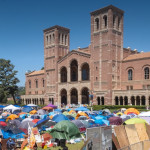After Allah’s decree and permission, your parents are the main reason for your existence. They nurtured you physically, emotionally, morally, and spiritually; without them, you could not have survived.
It is amazing that Islam uniquely connects acts that please Allah (‘azza wa jal) to acts that please one’s parents. There are more than fifteen places in the Qur’ān where the rights of parents have been stressed.
A very well-known verse of the Qur’ān expounds on this:
“And your Lord has decreed that you not worship except Him, and to parents, good treatment.
“Whether one or both of them reach old age [while] with you, say not to them [so much as], ‘uff’, and do not repel them but speak to them a noble word.” [1]
Additionally, mothers have been given special attention in the Qur’ān and the Sunnah as they generally care the most for their offspring and are also the most emotionally attached to their children.
For example, we read in the Qur’ān:
“And We have enjoined upon man [care] for his parents.
“His mother carried him, [increasing her] in weakness upon weakness, and his weaning is in two years.
“Be grateful to Me and to your parents; to Me is the [final] destination.” [2]
Similarly, when a man asked the Prophet ﷺ who amongst the people is most deserving of good treatment, he (ﷺ) replied,
“Your mother, again your mother, again your mother, then your father, then your nearest relatives according to the order (of nearness).” [3]
An expression of humbleness
Islam is a way of life that aims to lead humanity to success in all facets of life.
As a divine law, it acknowledges the fact that thanking parents is the logical and natural second step after thanking the Creator, to instil key qualities in human beings.
After all, thanking is an acknowledgment of achievements; a realisation of the favours which leads to love and care for others; a reflection of humbleness; and last, but not least, a transformation from individualism to co-operation and collaboration, due to acknowledgment of the interdependent nature of human beings.
And when we reflect on this, we realise that our ultimate dependence is to Allah (subḥānahu wa ta’āla), Who is free of any needs, independent and without any deficiency or reliance upon anyone in the least.
Thanking people
After thanking Allah, and then after thanking our parents, we need to recognise the importance of thanking people.
This is because Allah has decreed that every person, to some extent and at some point, will have to depend on others to achieve a desired outcome.
Example of a wealthy person who starves
For instance, a man may be given wealth by Allah, but in order to acquire food to eat, he would need to take his money to the baker and ask for a loaf of bread.
Simply having wealth would not be sufficient to get what he wants, and he would need to accept that the way of the world is such that we all need to interact and say words of thanks and praise (in other words, show gratitude) to get what we desire.
Example of a businessman without staff
Another example is a business person who wants to expand their business.
No matter how independent a person is, to increase sales or to grow, they would need to hire people and build a team, because no-one can do everything that is required to grow a successful business alone.
The application of this example extends beyond business to other organisations, governments, and even nation states.
Creating a virtuous circle
Being thankful to people will create a tremendous circle of virtue in which people will feel appreciated — this would have obvious implications for productivity and the harmonious nature of society in general.
A believer recognises that all good comes from Allah. The kind and helpful actions of people that Allah facilitates for us through His grace are no exception to this.
This is why the Messenger of Allah ﷺ said,
“Whoever does not thank people has not thanked Allah.” [4]
The Messenger of Allah ﷺ also said,
“The most grateful of people to Allah are those who are most grateful to people.” [5]
Trials and tests
As promised by Allah, every human is tested at various junctures of life and each test is unique for each person.
We quite rightly associate tests with hardship, but it also needs to be remembered that Allah will test some people with ease. Perhaps, in some cases, this may well be a far greater test to overcome.
Gratitude is required for all blessings at all times
Many people are blessed beyond imagination, but are they blessed with being able to express gratitude for their bounties? And furthermore, are they choosing to serve others and extend their blessings to those around them?
When living in abundance, it is common to take for granted what we have, or to forget where it came from. We may even grow arrogant and fall into a false sense of amazement at our own “achievements”. Clearly, this is very dangerous territory.
Ease and hardship both require gratefulness to Allah
Sometimes, doing without something makes us truly appreciate it when Allah grants it to us from His favour.
For instance, a person who has never experienced thirst may take the blessing of water for granted. So, gratitude is required for all blessings at all times whilst in abundance or in strained circumstances.
“Life is not about having it all.
“Be thankful for empty pockets and days of wanting. Those are the times you learn most about what life is.” [6]
Despite inevitable hardships, expressing gratitude to Allah is of utmost importance. No matter what the difficulty or challenge, acknowledging that Allah is the best of planners is essential.
Three hidden blessings in each test
As Ibn Abbas stated, every test contains three hidden blessings.
The first is that despite the calamity, one should be thankful that the situation is not worse than it could have been.
For instance, if someone is involved in a car accident and sustains whiplash, they should still be grateful for not breaking any bones. Such a person should find it in their heart to express shukr for their condition, as it could have been far more severe.
Secondly, shukr should be expressed that the tribulation related to worldly matters and not in matters of faith — which could have far more serious and lasting ramifications for a person’s Hereafter.
And lastly, shukr should be made if the tribulation was in this world and not the Hereafter, as such tribulations would be incomparably more difficult.
Allah says,
“No-one besides Allah can rescue a soul from hardship.” [7]
“Interruptions” in blessings
In life, there are bound to be “interruptions” in one’s blessings. These may manifest as a loss or a temporary halt to something that was previously enjoyed.
For instance, an athlete who relies heavily on their physical health may experience a broken bone that prevents them from playing sports. The good health that was enjoyed and previously taken for granted is suddenly disrupted with simple tasks becoming difficult. Things that he may never have even considered as a blessing now seem to be out of reach.
Let’s imagine that this athlete broke their foot and was unable to play sports, they may also come to recognise their reliance upon others to drive them around.
Such experiences highlight how individuals tend to take things for granted and often only appreciate their true value when they are no longer available or when they have to go without them for a period.
In this sense, the “interruption” of the blessing may well be a great blessing in itself.
The psychology of gratitude
Numerous psychological studies have examined the brain’s reactions when giving and receiving thanks, as well as the positive emotional response we experience during these interactions.
While many studies have been conducted on gratitude, most research agrees that it has a purely positive impact on individuals’ minds, bodies, and lives.
Happiness and gratitude are strongly linked, and neuro-scientific studies have discovered that feeling gratitude triggers the release of dopamine and serotonin in the brain — two neurotransmitters that promote feelings of happiness and well-being.
Practising gratitude daily strengthens neural pathways and contributes to a more positive and grateful outlook, ultimately leading to greater happiness in comparison to those who do not engage in exercises of gratitude.
“The soul that gives thanks can find comfort in everything: the soul that complains can find comfort in nothing.” [8]
Try and count your blessings
When considering gratitude, it becomes apparent that a believer should be in a constant physical and mental state of thankfulness.
This is the case, even though Allah is not in need of our praise or gratitude — being in this state benefits nobody but oneself.
The Prophet ﷺ said,
“Verily, Allah will put His servant to trial in what He gives him.
“Whoever is pleased with what Allah has apportioned for him, then Allah will bless him in it and expand it. Whoever is not pleased, he will never be blessed in it.” [9]
It is also important to remember that a believer recognises the importance of giving thanks for blessings, whilst being aware that the great abundance of blessings bestowed are all a result of Allah’s grace and mercy.
The reality is, no matter how much we thank Allah for His bounties, our praise will always fall short.
For instance, thanking Allah for each beat of your heart would not be sufficient; before we can thank Allah for one heartbeat, our heart will have already moved on to the next!
The mercy of Allah is endless. We will invariably fall short, even in the acknowledgement of these very blessings.
As Allah (subḥānahu wa ta’āla) reminds us,
“And if you should count the favours of Allah, you could not enumerate them.
“Indeed, Allah is Forgiving and Merciful.” [10]
Source: Islam21c
Notes
[1] al-Qur’ān, 17:23
[2] al-Qur’ān, 31:14
[3] Sahīh Muslim, 2,548; https://sunnah.com/muslim:2548b
[4] al-Tirmidhi, 1,954; https://sunnah.com/tirmidhi:1954
[5] al-Mu’jam al-Kabīr of al-Tabarāni, 425
[6] https://x.com/muftimenk/status/813355523298983936
[7] al-Qur’ān, 53:58
[8] https://www.goodreads.com/quotes/7420970-the-soul-that-gives-thanks-can-find-comfort-in-everything
[9] Musnad Ahmad, 20,279
[10] al-Qur’ān, 16:18







